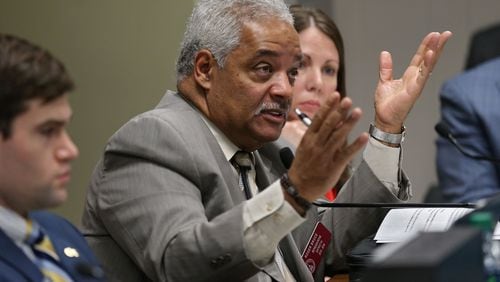A group of Georgia lawmakers on Thursday questioned why President Donald Trump's commission on election integrity needed to collect data on voters, saying they had heard from constituents who are afraid the information could be used against them.
Leaders from the Georgia Legislative Black Caucus said they planned to introduce a joint resolution for consideration during the General Assembly's next annual meeting early next year, seeking to block such information-sharing outside the state. While the resolution would largely be seen as symbolic — the caucus is Democratic and a majority of the state Legislature is Republican, as is state leadership — the group said they wanted to make a point.
“This for a lot of us takes us back to the days when African Americans went in to vote and they were asked to count jelly beans in a jar, and say how many jelly beans were in the jar before they were given the opportunity to vote,” said state Rep. Roger Bruce, D-Atlanta. He said he was most upset that the federal panel, which Trump created to investigate unsubstantiated claims of voter fraud during last year’s presidential election, had asked states to provide voters’ voting histories if that information was available.
“Whether you voted as a Democrat or whether you voted as a Republican — why is that relevant to whether or not there was fraud during voting?” Bruce said. “To me, things like that are saying we want to do something with that information to make sure that we have an advantage whenever the next election comes up – and that the other side has a disadvantage.”
Georgia officials have said some — but not all — of the requested information is already publicly available under state law for a standard fee of $250. They have requested payment of that fee before it will process the panel's request.
Georgia officials said they would not share information considered private under state law such as registered voters’ driver’s license numbers and Social Security numbers, although they planned to share data already made available to any member of the public who requests it — including voter names, addresses, race if provided by the voter and gender.







